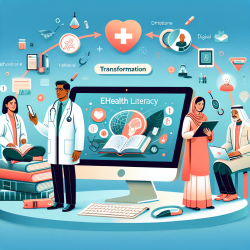The digital age offers numerous opportunities for healthcare professionals to enhance patient care through the use of electronic health (eHealth) resources. However, the effectiveness of these tools largely depends on the eHealth literacy of both patients and healthcare providers. A recent study titled "Patient and healthcare professional eHealth literacy and needs for systemic sclerosis support: a mixed methods study" sheds light on this crucial aspect.
Understanding eHealth Literacy
eHealth literacy refers to the ability to seek, understand, appraise, and apply health information from electronic sources to solve health problems. This skill set is essential for both patients and healthcare providers in making informed health decisions. The study highlights that while many patients with systemic sclerosis (SSc) use internet-based information and communication technologies (ICT) frequently, they often struggle with evaluating the reliability of online health information.
The Study's Key Findings
- Access to ICT: Most patients and professionals have access to necessary digital devices and the internet. However, there are concerns about the accessibility for older patients or those less familiar with technology.
- Understanding and Appraising Information: Although patients feel confident using technology, they need guidance in evaluating the reliability of online health information. Healthcare professionals also seek better tools to find suitable health apps for their patients.
- Lack of Experience with eHealth Support: Both groups reported limited experience with eHealth tools such as apps or online forums for self-management support.
- User-Centered Design: The study emphasizes involving stakeholders early in the development process to create user-friendly eHealth solutions that meet the needs of both patients and providers.
Practical Steps for Healthcare Professionals
The insights from this study provide a roadmap for healthcare professionals looking to improve their practice through enhanced eHealth literacy:
- Invest in Education: Both patients and providers need training to effectively use eHealth resources. Consider organizing workshops or webinars focused on improving digital literacy skills.
- Create Reliable Resources: Develop or recommend trustworthy online resources tailored to individual patient needs. This could include curated lists of reliable websites or apps.
- User Involvement in Design: Engage patients in the development of digital tools to ensure they are user-friendly and meet actual needs. This approach can enhance acceptance and usability.
- Cultivate a Supportive Environment: Encourage open communication about digital tools among your team. Sharing experiences can help identify best practices and address common concerns such as data security.
The Role of Online Therapy Services
TinyEYE's online therapy services exemplify how digital solutions can be integrated into educational settings to address staffing shortages and provide consistent support. By leveraging technology, schools can ensure that students receive timely interventions tailored to their unique needs.
The research underscores the importance of designing eHealth interventions that are responsive to end-user needs, which aligns with TinyEYE's mission to provide accessible therapy services through innovative technology solutions.
The Future of eHealth in Clinical Practice
The integration of eHealth into clinical practice offers promising prospects for improving patient outcomes. By focusing on enhancing eHealth literacy among both patients and providers, we can ensure that digital tools are effectively utilized to support patient care. As technology continues to evolve, staying informed through ongoing research and professional development is crucial for adapting practices that meet contemporary healthcare challenges.
If you're interested in exploring this topic further, consider reading the original research paper Patient and healthcare professional eHealth literacy and needs for systemic sclerosis support: a mixed methods study.










